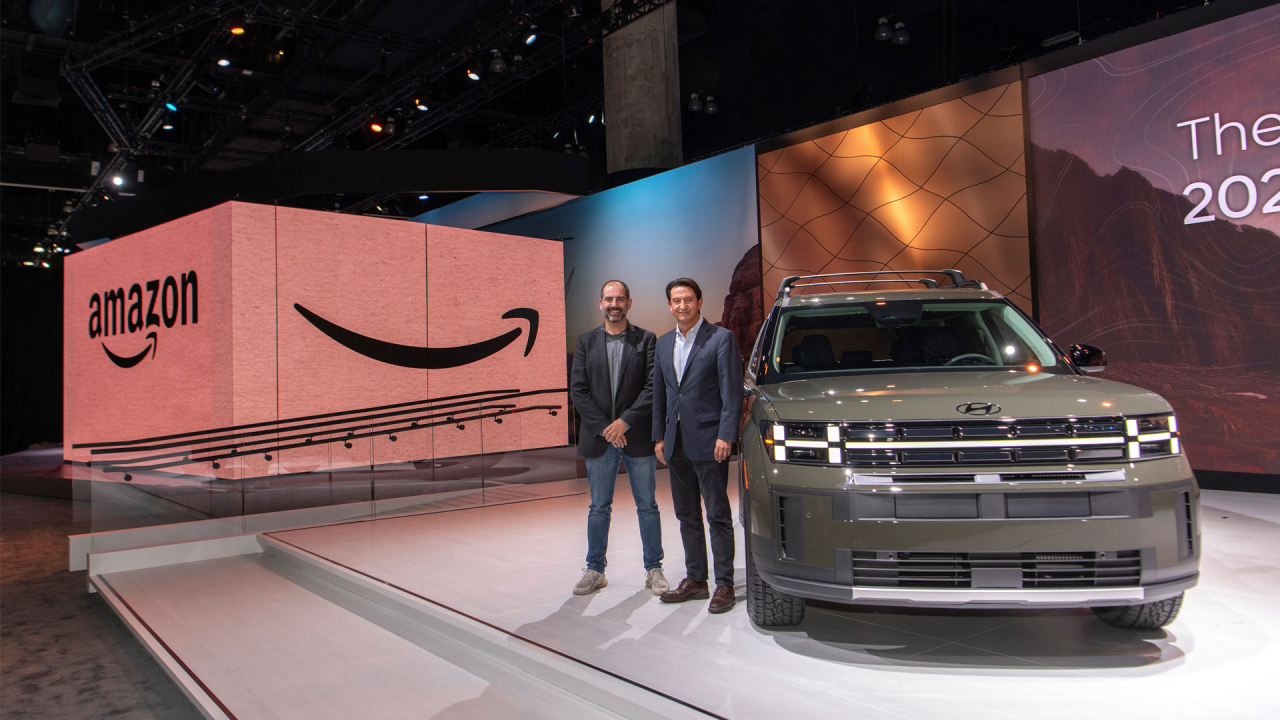Market Now
[KH explains] Hyundai to sell vehicles on Amazon in US sales push
 |
Marty Mallick (left), Amazon’s vice president for worldwide business and corporate development, and Jose Munoz, global chief operating officer at Hyundai Motor Group, pose for a photo next to the all-new Santa Fe at the LA Auto Show in the Los Angeles Convention Center in California, the US, on Nov. 16. (Hyundai Motor Group) |
Hyundai Motor Group’s cars will be sold online through Amazon for the first time in the US next year, offering an opportunity for the world’s third-largest carmaker to ramp up sales in the all-important market.
During the Los Angeles Auto Show on Nov. 16, Hyundai and Amazon announced that customers can purchase Hyundai vehicles -- internal combustion engine cars, electric vehicles, leased and used cars -- available in their area on the tech giant’s website from a local dealership. The vehicles can either be delivered or picked up.
Some 20 dealerships will start selling their cars on Amazon, but the number will grow by the end of next year, according to Hyundai.
“There will be no additional incentives to dealers to encourage them to be registered as sellers at Amazon,” an official from Hyundai Motor Group told The Korea Herald, adding that the dealerships are already receiving payment from the company as an inducement to sell Hyundai cars.
From April to June this year, Hyundai Motor’s incentive spending in the US surged on-year by 115 percent to an average of $1,330 per vehicle, data from Cox Automotive showed. The industry average was $2,048.
“But we’re negotiating with Amazon on whether Hyundai dealers (should) pay for the seller fees and, if so, (what the amount would be),” the official noted.
Experts say the carmaker might be willing to pay for the seller fees to induce more dealers to join the online platform, diversifying its sales channel that has been limited to retail dealerships offline.
“US auto giants including Ford and GM haven’t joined hands with Amazon because they feel no need to pay extra for their already costly dealership incentives,” said Lee Ho-geun, a car engineering professor at Daeduk University.
“But Hyundai, who is willing to (encourage) more dealers to join online sales, is likely to share the seller fees as part of its marketing costs, which make up 3 to 5 percent of the car price.”
Kim Pil-su, a car engineering professor at Daelim University, said, “Despite extra costs, Hyundai’s Amazon sales could be an effective strategy to increase its sales volume in the US market.”
“Hyundai car dealers can use one of the world’s biggest online shopping platforms to (increase sales) during times when they’re not seeing customers at their shops.”
Amazon can also improve customer experiences by cutting out the need to haggle with a dealer, as well as the price markups often seen at offline shops, Kim said, adding that “price competitiveness” is the key determinant of consumer preference in the online market.
But Hyundai might not make a notable profit when it comes to electric vehicles compared to its rival EV makers like Tesla, Rivian, Lucid and others, according to Lee. The new players sell vehicles directly online to consumers without going through dealerships, Lee noted.
Legacy auto manufacturers including Hyundai are bound by law to sell vehicles through franchised dealers. The Korean carmaker is already spending most of its US dealer incentives to promote EV sales.
According to Hyundai and Kia’s US subsidiaries, the two brands sold a combined 1.2 million units in the US during the January-October period, a 7.3 percent on-year decrease.
By Byun Hye-jin (hyejin2@heraldcorp.com)








